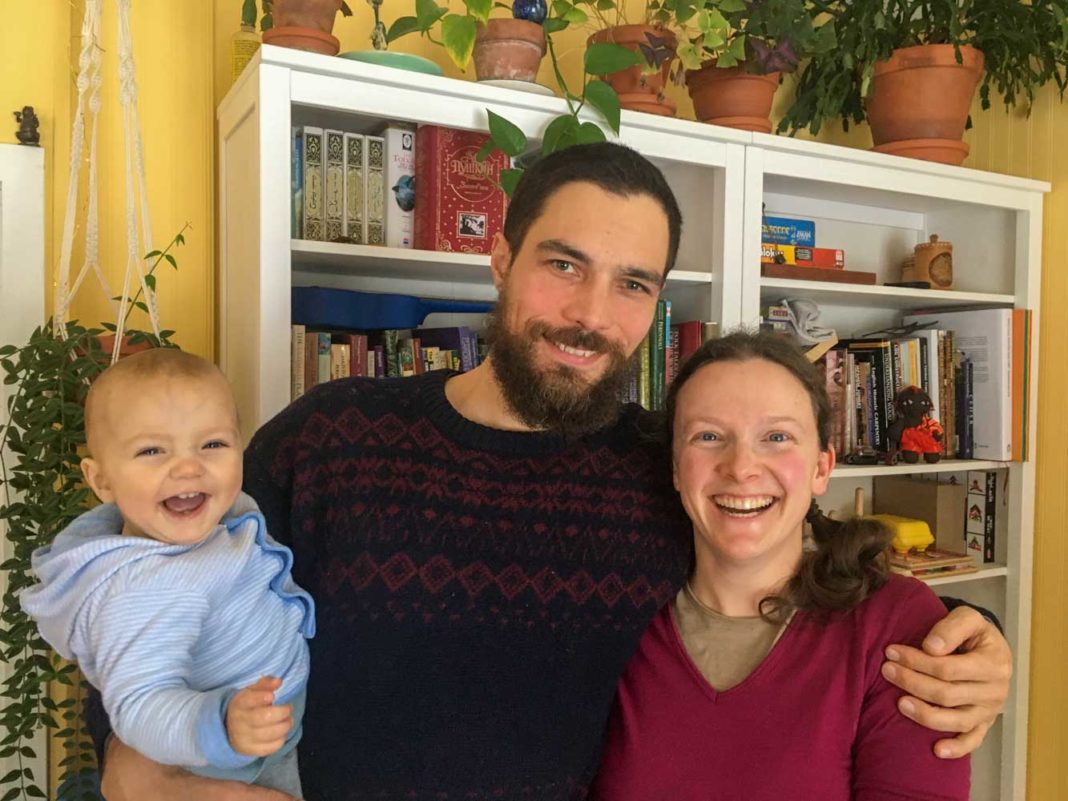by Heather Marshall
While it doesn’t have the same mystique that it did during the 1970s and 80s, hitchhiking remains a rite of passage for many young people and an affordable way of travelling. They live out of their backpacks while exploring the world, learning about the people and the land around them. Few, however, could match the mileage or extraordinary adventures of Anastasia Eranosova and George Kopylov. Hitchhiking propelled them across several continents before they eventually made Tehkummah their family’s long-term home.
George’s parents emigrated from Moscow, Russia to Canada in 2001 and settled in Toronto when he was in his late teens. Anastasia joined them a few years later. Once the duo spent several years in Ontario, where they mastered English, they moved on to Montreal to learn French. They stayed in the city long enough to become fluent in their third language. Both found jobs in their respective fields–Anastasia pursuing her passion for organic gardening and George working as a Red Seal Journeyman carpenter for a high-end residential building company.
Even though life was good in Montreal, the travel bug bit before long and Anastasia and George were once again sticking out their thumbs. They started an action-packed journey that would see them travel from Montreal to Ushuaia, the southern-most city in Argentina. Total strangers picked them up in cars, boats and 18-wheelers and then safely deposited them at their next stop along the roughly 12,000 km long multinational route.
“We learned Spanish on the road,” explains George. “We didn’t know a word when we first crossed the US-Mexican border,” adds Anastasia, “but we were pretty much fluent by the time we got to Peru.”
In all, it took two years to make it to Argentina’s Tierra del Fuego and back. Along the way, Anastasia and George were met with kindness and hospitality by local people. They generously shared their vehicles, knowledge of their area and, often, a meal or a place to stay for a night.
“Hitchhiking is such a special way to see the world. You are quite literally taken along for the ride by the local people. In the process, you learn about the area’s economy, environment and social issues and see first-hand how people live and work. The amazing thing is that you only meet kind, open-hearted people because the ones that don’t want to talk to you just don’t stop!”
By 2010 they had returned to Montreal, where they quickly fell into the same routines they had left behind: doing similar work, buying a car and renting an apartment. They maintained their interest in globetrotting by hosting international travellers who stayed with them through the Couchsurfing website. It connects travellers with hosts who are willing to share their homes without any money in exchange.
“One of the people who stayed with us was a German woman, a “wandergeselle”–a travelling trades person, a cabinet maker,” says Anastasia. “She encouraged us to go to Europe where we could use our trades and learn new techniques.”
Still young and footloose, wanderlust led them on their next great adventure. This time, they travelled to England after getting work and travel visas. As always, they hitchhiked through the countryside until they found timber-framing companies and English gardens where they could work and nurture new skills.
Anastasia found her dream job working in the gardens of the Gravetye Manor House Hotel, a 16th-century house and gardens nestled in the Sussex countryside where the legendary gardener, William Robinson, had started the English cottage gardens movement. The Manor’s Michelin-star restaurant includes a two-acre stone-walled oval kitchen garden. Meanwhile, George landed a position as a carpenter where he worked in traditional Tudor-era English timber framing.
The couple spent a total of five years travelling the Americas, working throughout the UK and touring around France and Germany. However, the novelty of their nomadic life no longer had the same allure as they found themselves thinking about settling down.
In 2015 they returned to Canada, looking for a place to put down roots. They knew they wanted to live in the countryside and initially explored small communities in the Kawarthas and Muskoka regions.
Concluding that both were too expensive and too busy, a chance conversation with a stonemason friend made them aware of potential work on Manitoulin.
An introduction was made to Madonna and Roland Aeschlimann in February 2016. A follow-up visit to Tehkummah later that spring resulted in a carpentry job with Roland for George and gardening at JD’s Garden Centre for Anastasia. After renting a guest cabin from the Aeschlimanns for the summer, they purchased the house, and the Aeschlimanns moved to their new home on a nearby farm.
The couple also launched their own businesses. The Island Gardener, Anastasia’s ecological gardening company, helps people design, install, and maintain gardens in an ecologically sound way. Manitoulin Timber Frames, George’s specialty form of carpentry, focuses on hand-crafted traditional timber framing.
They also started the Tehkummah Seed Exchange in 2017, an annual event held mid-February when people exchange seeds and their love of gardening with each other. The 2020 pre-pandemic seed exchange featured live music, vendors, delicious vegetarian food, children’s activities, lots of free seeds and over 120 attendees.
Apart from starting their own businesses and doing community work, the couple has been kept busy and happy with the birth of their 18-month-old toddler, Vasily.
“Everything fell into place for us here,” says George. “We feel that life has been generous to us. We experienced awesome things in our travels, but nothing like this. Here it is one good thing after another.”
Anastasia sums it up by observing that, “Living here has made me aware we live on Indigenous land. We see ourselves as guests and caretakers of our small plot, growing our own food and being kind to the Earth. Now, with a family of our own, this is the best place to be and the best of times.”





